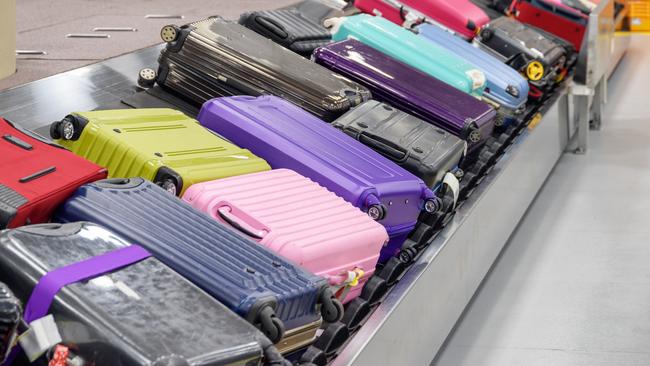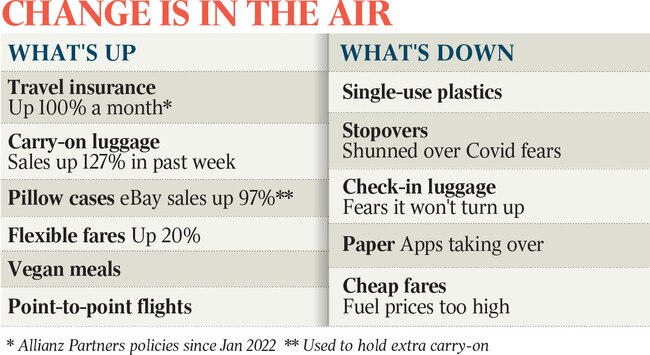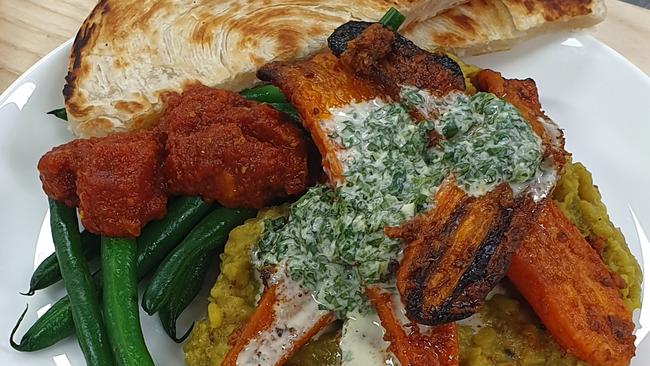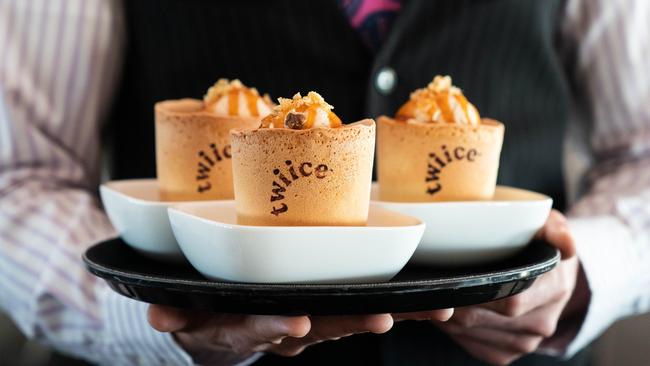How Covid has transformed international travel
International travel has been transformed by Covid as passengers shun checked in bags in favour of carry on, dine on plant-based meals, book flexible fares, and fly long distances in single aisle jets.

From the rise of carry-on luggage to plant-based meals, international travel has undergone a metamorphosis during the Covid pandemic, with more to come.
Among the most striking changes are an explosion in sales of carry-on luggage, an increased take-up of travel insurance and flexible fares, the rise of plant-based meals on in-flight menus, and longer point-to-point flights in narrow body jets.
With frequent reports of passengers’ luggage going amiss on flights, travellers are increasingly trying to avoid checking in bags, by using skilfully packed carry on instead. In the past week, shopping site eBay reported a 127 per cent increase in sales of carry-on bags, as well as a 97 per cent jump in pillowcase purchases.
EBay spokeswoman Sophie Onikul said the popularity of pillow slips could be linked to a viral video hack showing travellers stuffing cases with clothes as a way to supplement carry-on.
“Amid the chaos and queues at domestic and international airports, Aussies are facing extra emotional baggage before they’ve even stepped onto the plane,” said Ms Onikul.
“As mounting fears of losing items are coupled with further baggage delays, it’s no wonder Aussies are ditching checked luggage and choosing to travel with carry-on cases instead.”
Insurance company Allianz Partners reported a near 100 per cent jump in the sale of travel policies every month since January, with 40 countries now demanding Covid cover for entry.
In addition, the company was fielding twice as many calls compared to 2019, in response to the surge in international travel and constantly changing travel environment.
Allianz Partners chief market manager Damien Arthur said no longer was travel insurance a “grudge purchase” for people heading overseas but a must-have.
“We have noticed our customers are closely considering and assessing the purchase of their travel insurance,” Mr Arthur said.

“Customers are taking extra time to consider different scenarios, what may be covered and what is not, and are showing a strong appetite to understand the coverage provided if they become sick with Covid-19.”
Booking site Webjet was also aware of a growing appetite for more expensive flexible fares, to avoid hefty surcharges for any changes to plans.
A survey of 5000 customers found 20 per cent valued flexibility when booking flights and accommodation due to high levels of travel disruption during the pandemic.
On board flights, travellers were finding plant-based meals and artificial meat on the menu of airlines like Air New Zealand, United and Delta Air Lines, with Qantas also exploring the possibility of meat substitutes.

Air New Zealand was also giving premium passengers the chance to devise their own meals, with the option to add fish, meat or extra vegetables to a pasta bowl or salad.
Customer general manager Leeanne Langridge said the concept came from consumer research undertaken during the pandemic showing customers wanted more choice in the air.
An absence of single-use plastics was another change travellers might notice with airlines committed to slashing waste as part of their sustainability goals.
Qantas aimed to send nothing to landfill by 2030, and Irish low-cost carrier Ryanair planned to be plastic free by 2023.
In the place of plastic cutlery, plates and cups were utensils made from bioplastics and cornstarch as well as edible crockery and meal trays.

A less passenger-friendly shift could be the dominance of single-aisle aircraft which currently outnumber double-aisle aeroplanes by three to one. Aviation experts say these narrow-body planes like the A220 and Boeing’s Max model are up to 30 per cent more fuel efficient.







To join the conversation, please log in. Don't have an account? Register
Join the conversation, you are commenting as Logout